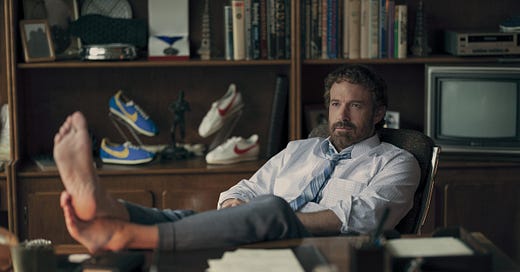
Air is an interesting movie on several levels, a couple of them only tangentially related to the film itself.
The film itself is perfectly fine, perhaps even very fun. Air is oddly framed in the way all such pictures are—think of the recent Tetris or, more traditionally, musical biopics like Bohemian Rhapsody or Walk the Line: as an underdog story in which we already know that the underdog is going to be triumphant because it’s a real story about a real smash success. And yet, the picture still manages to wring a little suspense out of the story of Michael Jordan’s decision to sign with Nike over better-selling competitors Converse and Adidas simply by making the characters so compelling.
Sonny Vaccaro (Matt Damon) is a shoe hustler making the rounds on the high school circuit, getting Nikes on the feet of kids who are headed to college and will, hopefully, sign with the brand if they are fortunate enough to hit the pros. But Nike’s basketball division is stumbling and the company as a whole, freshly public and beholden to a board for the first time in owner Phil Knight’s (Ben Affleck, who also directs) tenure, is worried about the basketball division. Maybe Nike is, simply, destined to be a shoe for joggers.
This would be a disaster for the people who work at Nike; as division head Rob Strasser (Jason Bateman) sadly informs Sonny at one point, he’s going through a divorce and every weekend he gets to see his daughter he brings her a new pair of shoes. The shoes represent love. And we all want to feel loved.
Well, some of us want to get paid, too, and that’s the central dilemma at the heart of Air. Sonny wants to commit Nike’s whole signing allotment on one Michael Jordan, whose agent, David Falk (Chris Messina), is crudely and curtly dismissive of the company and whose mother, Deloris (Viola Davis), has her eyes on a bigger prize: a piece of the pie. She wants a cut of every shoe. Equity. Something no shoe company would ever give an athlete because equity is something controlled by the big studios—I mean, sorry, the big shoe companies.
Air is, notably, the first movie from Affleck and Damon’s studio, Artists Equity, and the goal of Artists Equity is to ensure that everyone involved with the production of a movie gets a piece of the pie, from the above-the-line talent on down. So when Deloris talks about how every so often someone comes along and changes the game and ensures that the workers get a little fairer treatment, well, it’s hard not to think of writer Alex Convery sitting there, watching the clip, and smiling while he thinks about his share of the $120 million Amazon reportedly paid to obtain and produce Air.
And this is why Air is more interesting as a piece of business than as a piece of filmmaking. Again, as a movie, it’s fine. Ben Affleck is a good director with a fine sense of pacing and framing and comic timing. As in the Ridley Scott-helmed The Last Duel, Affleck is perfectly cast as a variety of lordly, out-of-touch aristocrat who is vaguely annoyed with an impetuous underling played by Matt Damon. It’s a natural fit for the two of them, and I would happily watch them make a dozen pictures with similar relationships for Artists Equity.
But as a piece of business, it heralds the future in a couple of key ways. The first is, ironically, how it nods to the past: If you don’t hear an echo of United Artists—the studio founded by Charlie Chaplin, Mary Pickford, D.W. Griffith, and Douglas Fairbanks—you should. There, too, was a studio designed to enrich talent and maintain production control. As streamers move toward all-in deals that pay more for films in order to buy out profit participation on the back end, you’ll see more talent try to take advantage of the situation.
The second is the way that Air’s theatrical run is little more than an extended advertising campaign for its debut on Prime Video, where most people will end up seeing it. Air’s box office has likely covered the cost of advertising the theatrical run and not much more. But that’s all they really needed to cover, because viewers get more excited for movies that show up on streaming if they play in theaters first. If something shows up on streaming first, it is relegated to the same liminal category of straight-to-VHS/DVD/VOD films of years past. Fair or not, most viewers think of films that play in theaters as “real movies,” clearing one mental hurdle that makes it worth carving out precious time for. Something that goes straight to streaming has a strike against it in the public consciousness.
This is, perhaps, the way we recover the mid-budget movie for adults, the loss of which was lamented so memorably by Damon as he choked down spicy chicken wings on Hot Ones. Either way, it’s a movement worth keeping an eye on. Because showbiz is as much about the biz as it is about the show. And if you don’t understand the biz, you can’t possibly understand which shows are getting made.










